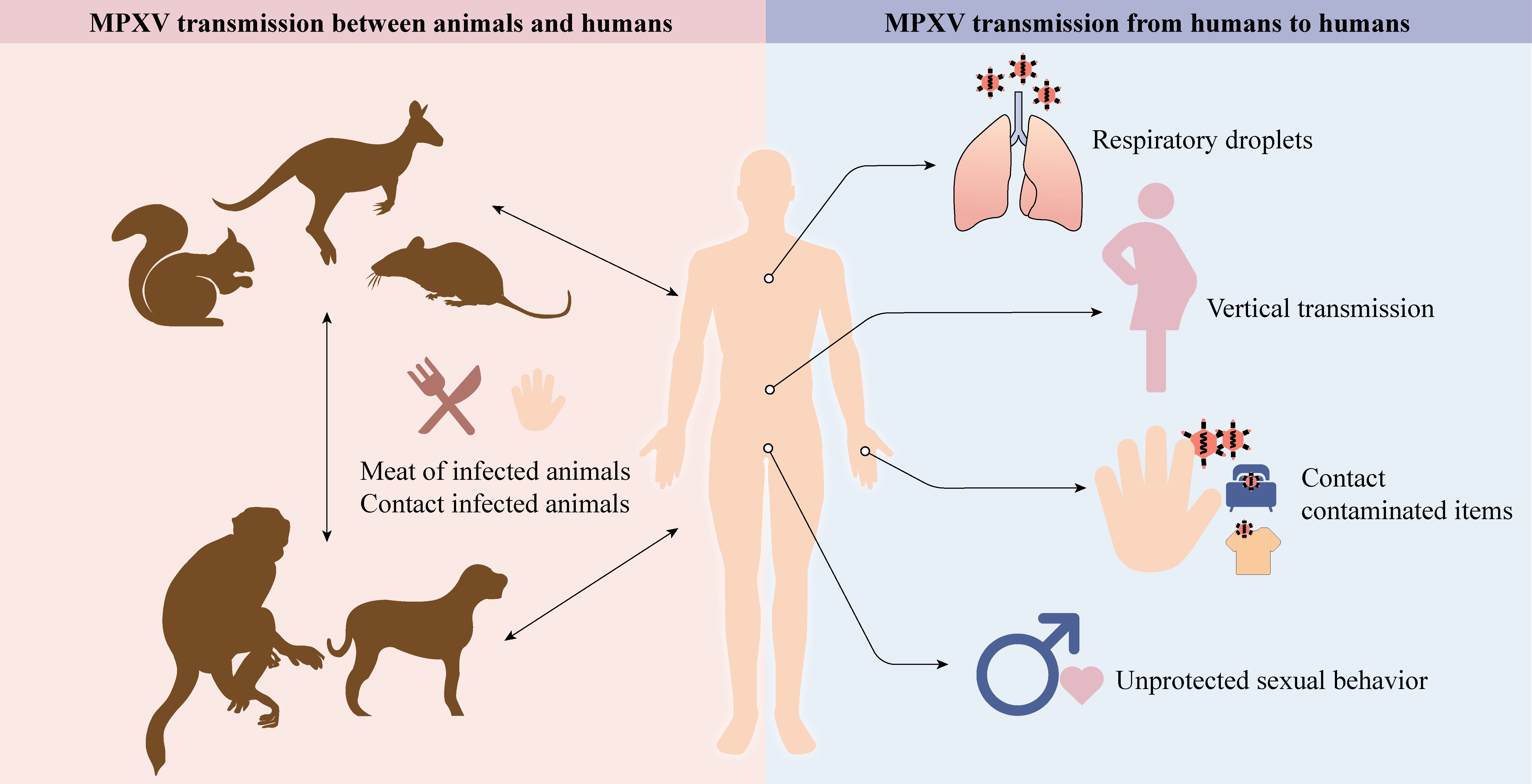
95% of researchers rate our articles as excellent or good
Learn more about the work of our research integrity team to safeguard the quality of each article we publish.
Find out more
CORRECTION article
Front. Immunol. , 02 April 2025
Sec. Viral Immunology
Volume 16 - 2025 | https://doi.org/10.3389/fimmu.2025.1592351
This article is a correction to:
Global transmission of monkeypox virus—a potential threat under the COVID-19 pandemic
A Corrigendum on
Global transmission of monkeypox virus—a potential threat under the COVID-19 pandemic
by Wang Y, Leng P and Zhou H (2023) Front. Immunol. 14:1174223. doi: 10.3389/fimmu.2023.1174223
In the published article, there was an error in Figure 1 as published. We have misused the word “inappropriate” which can be perceived as inaccurate and non-scientific, and instead replaced it with the word “unprotected”. The corrected Figure 1 and its caption appear below.

Figure 1. Animals, like rodents, dogs, and non-human primates, can spread MPXV to humans (cartoons modified from the SciDraw website). Respiratory droplets, vertical transmission, contact with contaminated items, and unprotected sexual behavior enable MPXV to transmit between humans.
In the published article, there was an error. We have misused the word “inappropriate”, which can be perceived as inaccurate and non-scientific. A correction has been made to 5.2 MPXV transmission from humans to humans, 5.2.1 Sexual transmission. This sentence previously stated:
“A recent meta-analysis including 124 MPXV cases demonstrated that inappropriate sexual behavior is the primary mode of transmission route (46).”
The corrected sentence appears below:
“A recent meta-analysis including 124 MPXV cases demonstrated that unprotected sexual behavior is the primary mode of transmission route (46).”
This sentence previously stated:
“For example, Antinori et al. reported that 4 infected young adults in Italy were exposed to inappropriate sexual encounters.”
The corrected sentence appears below:
“For example, Antinori et al. reported that 4 infected young adults in Italy were exposed to unprotected sexual encounters.”
The authors apologize for these errors and state that they do not change the scientific conclusions of the article in any way. The original article has been updated.
All claims expressed in this article are solely those of the authors and do not necessarily represent those of their affiliated organizations, or those of the publisher, the editors and the reviewers. Any product that may be evaluated in this article, or claim that may be made by its manufacturer, is not guaranteed or endorsed by the publisher.
Keywords: monkeypox virus, transmission, airline travel, detection, vaccination
Citation: Wang Y, Leng P and Zhou H (2025) Corrigendum: Global transmission of monkeypox virus—a potential threat under the COVID-19 pandemic. Front. Immunol. 16:1592351. doi: 10.3389/fimmu.2025.1592351
Received: 12 March 2025; Accepted: 13 March 2025;
Published: 02 April 2025.
Approved by:
Frontiers Editorial Office, Frontiers Media SA, SwitzerlandCopyright © 2025 Wang, Leng and Zhou. This is an open-access article distributed under the terms of the Creative Commons Attribution License (CC BY). The use, distribution or reproduction in other forums is permitted, provided the original author(s) and the copyright owner(s) are credited and that the original publication in this journal is cited, in accordance with accepted academic practice. No use, distribution or reproduction is permitted which does not comply with these terms.
*Correspondence: Hao Zhou, aGFvemhvdUBjZHV0Y20uZWR1LmNu
†These authors share first authorship
Disclaimer: All claims expressed in this article are solely those of the authors and do not necessarily represent those of their affiliated organizations, or those of the publisher, the editors and the reviewers. Any product that may be evaluated in this article or claim that may be made by its manufacturer is not guaranteed or endorsed by the publisher.
Research integrity at Frontiers

Learn more about the work of our research integrity team to safeguard the quality of each article we publish.